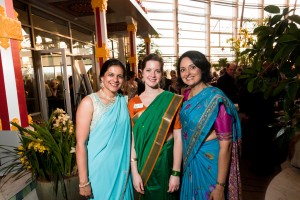By Meena Mutyala, Fox Chapel, PA
Meena Mutyala grew up in Nagpur, India, went to IIT Madras and then to graduate school at Northwestern University. She also obtained her executive MBA from the University of Pittsburgh. She and her husband Brahmaji are long-time residents of this area and have two adult children. She works in a large international company in Pittsburgh. Note: The pictures in this story are from Renee Rosensteel.
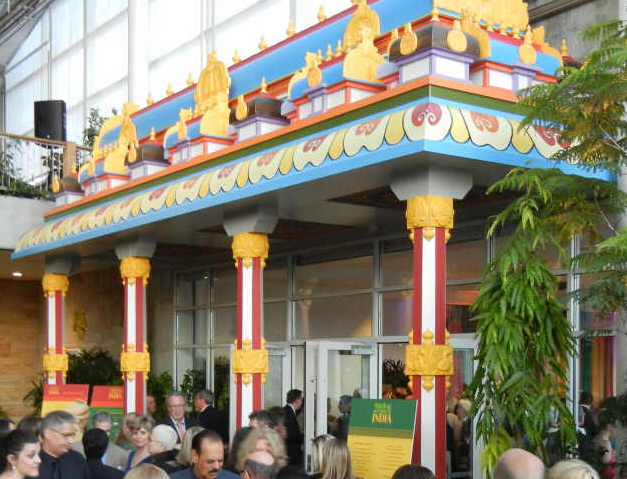
The facade of a typical South Indian Temple created by Sthapati Ayyachami Narayanan of Penn Hills at the Phipps Tropical Forest India Exhibit.
Saturday, March 17. The temperature was in the 70s and humidity pleasantly low. The orÂganizers at Phipps Conservatory could not have asked for a more pleasant day for the inaugural gala for unfurling The Tropical Forest India, the 3-year-long live exhibit. An overflowing number of nearly 400 people — trustees of Phipps, Phipps officials, patrons, volunteers, and others, among whom were a large number of Indian-Americans — gathered under the canopy of lush tropical plants of India with the sights, sounds, aroma and the bustle of an Indian celebration. Rangoli at the entrance creÂatively done with toor dal, masoor dal and rajma beans; delicious fusion food; music; tasteful Indian decorations and tapestry and decorations — all amidst exotic Indian plants — created an ambience that was truly unique and special.
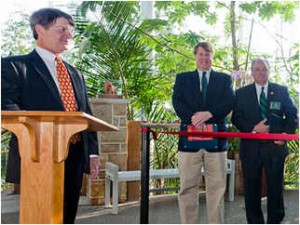
During inauguration L to R: Phipps' Richard Piacentini, Allegheny Co. Chef Executive Rich Fitzgerald, and Penna's US Congressman Mike Doyle.
 This exhibit was planned for over two years with Ben Dunigan and Jordyn Melino, the two horticulturalists at Phipps, traveling to India in 2010 and spending weeks in the lush Western Ghat region. Since then, they have devoted themselves to Tropical Forest India from the design phase through the installation and the grand opening. The researching of the plants and obtaining the special plant species from the Western Ghats and the Himalayan/Assam region has been their passion. They also took the lead in the overall décor of the exhibit. Jordyn came to the event on March 17th in a green Kanchi saree — appropriate for St. Patrick’s Day on that Saturday and for an Indian celebration!
An ornate entrance in the form of an Indian temple façade led the guests into the Special Events Hall. This richly colorful entrance was created lovingly by our own SthaÂpati Ayyachami Narayanan (who did most of the decorative sculpÂtural work and the repair work on the towers at the S.V.Temple) working closely with Dunigan on the design and colÂor scheme. The ceiling of the Special Events Hall is painted with elaborate murals patterned after the Madurai palace ceilings by the Pittsburgh-based Indian-American artist, Francis Cleetus.
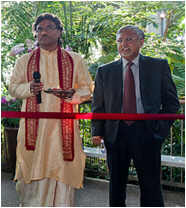
Pandit Vinod Kumar Pandey from H-J Temple reciting Sanskrit hymns during the opening ceremony with Pramod Bajaj from New York Indian Consulate standing beside him.
For both Narayanan and Francis, this was a unique opportunity for showcasing India’s visual arts to all those visiting Phipps during the next three years. They worked enthusiastiÂcally for two months and the result is spectacular. With its grand entrance, the Special Events Hall is going to be a perfect place to rent for private Indian events.
The Honorary Chairs of the Gala Event were Krishna and Om Sharma. Vijayalakshmi MadÂhavan provided a veena recital with Johnson Kottakalil Paul (a disciple of Pt. Keshab Kanti Chowdhury of Delhi Gharana) providing laya (percussion) support on the tabla. There was also a classical Kathak recital by Varun and Sonia Mahajan, and Bhangra dancing.
As the night moved on and we had our fill of interesting conversations, great food and drinks, many – including several from Mainstream USA — got into Bollywood dancing!
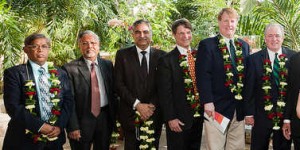 L to R: Sthapati Ayyachami Narayanan; Pramod Bajaj from the Indian Consulate in New York; Rajiv Malik, President Mylan Inc.; Richard Piacentini of Phipps; Rich Fitzgeral, Chief Executive of Allegheny Co.; and Penna’s US Congressman Mike Doyle during the inauguration.
L to R: Sthapati Ayyachami Narayanan; Pramod Bajaj from the Indian Consulate in New York; Rajiv Malik, President Mylan Inc.; Richard Piacentini of Phipps; Rich Fitzgeral, Chief Executive of Allegheny Co.; and Penna’s US Congressman Mike Doyle during the inauguration.
The gala opening event and the overall exhibit gave me a sense that the Indian American community and Indian culture and traditions have become an integral part of the Pittsburgh arts and cultural scene. As Ritu Thamman, one of the members of the planning committee, put it, “I feel so proud that this has happened in Pittsburgh and we can showcase Pittsburgh and India for the next three years.â€
Phipps Executive Director Richard Piacentini was effusive in acknowlÂedging the work that has gone into this project: “In addition to the efforts and creative vision of the forest curator Ben Dunigan, program specialist Jordyn Melino and other staff, a tremendous amount of talent, knowledge and support from Indian communities in Pittsburgh and abroad went into plans for Tropical Forest India.â€
Greg DuFour, Director, Development Campaign at Phipps said, “It is our hope that this unique exhibit celebrating one of the most precious natural areas on earth will captivate visitors with its beauty, inspiring them to explore the many ways we can all help promote biodiversity with the choices we make every day.â€
Make it a point to get out to Phipps and see the 12,000 square feet of Indian ethnobotanic displays and also the cultural and educational programs that highlight the people, culture and flora of India in all its diverse splendor.
And when we have out of town guests, let us show off Phipps — the glass jewel of Pittsburgh and the world’s most energy-efficient greenhouse that now houses the splendid Tropical Forest India exhibit.
Acknowledgment: The graphics in the stories are by Renee Rosensteel. ï®

